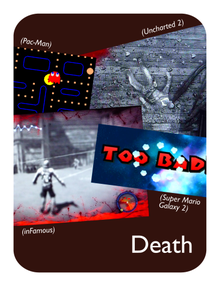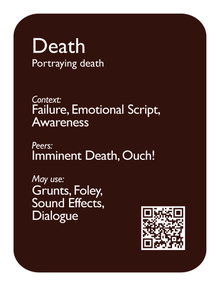Difference between revisions of "Death"
ValterAlves (Talk | contribs) m |
ValterAlves (Talk | contribs) m |
||
| (35 intermediate revisions by the same user not shown) | |||
| Line 2: | Line 2: | ||
| name =Death | | name =Death | ||
| deckversion =1.0 | | deckversion =1.0 | ||
| − | | | + | | v10synopsis =Portraying death |
| + | | v20synopsis =Portraying death | ||
| patternpresentation = | | patternpresentation = | ||
| cardpresentation= | | cardpresentation= | ||
| − | | | + | | v10frontface =Death-front-v10.png |
| − | | | + | | v10backface =Death-back-v10.png |
| + | | v20frontface =Death-front-v20.png | ||
| + | | v20backface =Death-back-v20.png | ||
| screenshots= | | screenshots= | ||
| − | | | + | | v10rel-tag1=Context:<br> |
| − | | | + | | v10rel1=[[Failure]], [[Emotional Script]], [[Awareness]]<br> |
| − | | | + | | v10rel-tag2=Peers:<br> |
| − | | | + | | v10rel2=[[Imminent Death]], [[Ouch!]]<br> |
| − | | | + | | v10rel-tag3=May use:<br> |
| − | | | + | | v10rel3=[[Grunts]], [[Foley]], [[Sound Effects]], [[Dialogue]]<br> |
| + | | v20rel-tag1=Context:<br> | ||
| + | | v20rel1=[[Failure]], [[Emotional Script]], [[Awareness]]<br> | ||
| + | | v20rel-tag2=Peers:<br> | ||
| + | | v20rel2=[[Imminent Death]], [[Ouch!]]<br> | ||
| + | | v20rel-tag3=May use:<br> | ||
| + | | v20rel3=[[Grunts]], [[Foley]], [[Sound Effects]], [[Dialogue]]<br> | ||
| revisions =Introduced in version 1.0 | | revisions =Introduced in version 1.0 | ||
| + | | description = | ||
| + | |||
| + | In games where the idea of "live(s)" is part of the gameplay, the condition of the PC's [[Death]] represents an extreme condition of [[Failure]], calling for an appropriate level of [[Awareness]]. | ||
| + | |||
| + | Moreover, the ("real-life") concept of death holds inherent associations to emotions that may be explored in games, namely with the contribution of sound design, both to enrich the ([[Emotional Script]]) and to emphasize the pertinence of avoiding such condition. | ||
| + | |||
| + | In some games the PC's [[Death]] is an acoustically complex episode, involving for instance PC's [[Grunts]] ([[Ouch!]]), NPC's [[Dialogue]] (of sympathy or despise), [[Foley]] from the action conducing to the death, and some additional [[Sound Effects]]. | ||
| + | |||
| + | For the design of PC's [[Death]] it is crucial to assess the expected recurrence of dying, according to the gameplay and difficulty level. For instance, [[Variety]] may be required to avoid compromising the emotional intention upon repetition. | ||
| + | |||
| + | Conversely, NPC's [[Death]], being a frequent and usually intended event (that is, emotionally positive), usually consists of simpler stimuli serving essentially as a death certificate ([[Awareness]]). In some games the possible emotional distress related to the idea of death is completely absent and the "termination" of opponents is purely characterized as an [[Achievement]]. | ||
| + | |||
| examples= | | examples= | ||
| − | | ex1=<mt p="Death" g="Infamous" altg="InFamous" h=" | + | | ex1=<mt p="Death" g="Infamous" altg="InFamous" w="{{R16by9W}}" h="{{R16by9H}}">[[Death]] coming as the conclusion of a non reversed condition of [[Imminent Death]].</mt> |
| − | | ex2=<mt p="Death" g="MGS4" altg="Metal Gear Solid 4" h=" | + | | ex2=<mt p="Death" g="MGS4" altg="Metal Gear Solid 4: Guns of the Patriots" w="{{R16by9W}}" h="{{R16by9H}}">[[Death]] as a deeply emotional episode, including despair comments from friendly NPC, also supported by powerful visuals.</mt> |
| − | | ex3=<mt p="Death" g="Uncharted" h=" | + | | ex3=<mt p="Death" g="Uncharted" altg="Uncharted: Drake's Fortune" w="{{R16by9W}}" h="{{R16by9H}}">[several instances] The [[Dialogue]] from friendly NPC plays a strong emotional role in the perception of [[Death]].</mt> |
| − | | ex4=<mt p="Death" g=" | + | | ex4=<mt p="Death" g="Mirrors Edge" altg="Mirror's Edge" w="{{R4by3W}}" h="{{R4by3H}}" i=2>The [[Foley]] sounds of the body crashing in the ground effectively convey an uncanny sense of embodiment.</mt> |
| − | | ex5=<mt p="Death" g=" | + | | ex5=<mt p="Death" g="HalfLife2" altg="Half-Life 2" w="{{R8by5W}}" h="{{R8by5H}}">The [[Foley]] of the action causing [[Death]], followed by an impaired perception of the [[Ambiance]].</mt> |
| − | | ex6=<mt p="Death" g="Pac Man" h=" | + | | ex6=<mt p="Death" g="Pac Man" altg="Pac-Man" w="{{ViPhoneW}}" h="{{ViPhoneH}}">Despite the non realistic scenario and the frequency of the event, this sound keeps being emotionally effective.</mt> |
| − | | ex7=<mt p="Death" g="Papa Sangre" h=" | + | | ex7=<mt p="Death" g="Papa Sangre" w="{{ViPhoneH}}" h="{{ViPhoneW}}">The tension maintained during the gameplay and the embodied violence of the attack make [[Death]] an emotionally intense experience.</mt> |
| − | | ex8=<mt p="Death" g="Patapon" h=" | + | | ex8=<mt p="Death" g="Patapon" w="{{R16by9W}}" h="{{R16by9H}}">The [[Death]] of individual patapons is mixed with the on-going composition.</mt> |
| − | | ex9=<mt p="Death" g=" | + | | ex9=<mt p="Death" g="Ico" w="{{RPS2W}}" h="{{RIcoH}}">A rare (also sonic) characterization of Death. The fulminant [[Sound Effects|Sound Effect]] exposes a baffling sense of impotence and irreversibility once the condition is met, contrasting with the players urge to avoid it. The PC doesn't even have the chance to participate in the composition (e.g., no [[Grunts]]).</mt> |
| − | | ex10=<mt p="Death" g=" | + | | ex10=<mt p="Death" g="Shadow of the Colossus" w="{{RPS2W}}" h="{{RPS2H}}"></mt> |
| + | | ex11=<mt p="Death" g="Chaos Theory" g="Chaos Theory" altg="Tom Clancy's Splinter Cell Chaos Theory" w="{{R5by4W}}" h="{{R5by4H}}"></mt> | ||
| + | | ex12=<mt p="Death" g="Isaac" altg="The Binding of Isaac" w="{{R8by5W}}" h="{{R8by5H}}"></mt> | ||
| + | |||
}} | }} | ||
Latest revision as of 22:32, 25 August 2012

|

| |
| The card's front face | The card's back face |
Contents
Synopsis
| Portraying death. |
Relationships
Context:
Failure ![]() , Emotional Script
, Emotional Script ![]() , Awareness
, Awareness ![]() .
.
Peers:
Imminent Death ![]() , Ouch!
, Ouch! ![]() .
.
May use:
Grunts ![]() , Foley
, Foley ![]() , Sound Effects
, Sound Effects ![]() , Dialogue
, Dialogue ![]() .
.
Description
In games where the idea of "live(s)" is part of the gameplay, the condition of the PC's Death represents an extreme condition of Failure, calling for an appropriate level of Awareness.
Moreover, the ("real-life") concept of death holds inherent associations to emotions that may be explored in games, namely with the contribution of sound design, both to enrich the (Emotional Script) and to emphasize the pertinence of avoiding such condition.
In some games the PC's Death is an acoustically complex episode, involving for instance PC's Grunts (Ouch!), NPC's Dialogue (of sympathy or despise), Foley from the action conducing to the death, and some additional Sound Effects.
For the design of PC's Death it is crucial to assess the expected recurrence of dying, according to the gameplay and difficulty level. For instance, Variety may be required to avoid compromising the emotional intention upon repetition.
Conversely, NPC's Death, being a frequent and usually intended event (that is, emotionally positive), usually consists of simpler stimuli serving essentially as a death certificate (Awareness). In some games the possible emotional distress related to the idea of death is completely absent and the "termination" of opponents is purely characterized as an Achievement.
Examples
  |
  Uncharted: Drake's Fortune: [several instances] The Dialogue from friendly NPC plays a strong emotional role in the perception of Death.
|
  Mirror's Edge: The Foley sounds of the body crashing in the ground effectively convey an uncanny sense of embodiment.
|
  Ico: A rare (also sonic) characterization of Death. The fulminant Sound Effect exposes a baffling sense of impotence and irreversibility once the condition is met, contrasting with the players urge to avoid it. The PC doesn't even have the chance to participate in the composition (e.g., no Grunts).
|







